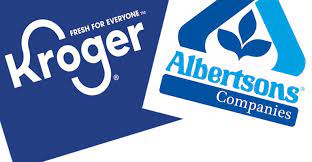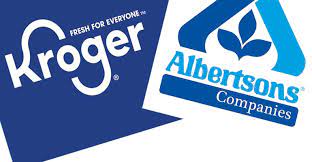
The grocery company Kroger is set to acquire smaller rival Albertsons for $24.6 billion, but the U.S. Federal Trade Commission and eight states said on Monday that they are suing to stop the merger, claiming it will drive up grocery prices for millions of Americans.
Legislators and consumer advocacy organisations are closely monitoring the merger, which if approved would establish a grocery empire with over 4,000 locations. They are concerned about increased grocery costs, job losses, store closures, and a reduction in consumer choice.
Food inflation is expected to slow down in 2024, but buyers' concerns about their shopping expenses are intensifying as a result of the 25% increase in food prices in the United States during the previous four years.
The agreement would help Kroger maintain its position as the second-biggest competitor to Walmart in the US supermarket sector.
The FTC's action coincides with the Biden administration's quest for cheaper grocery prices and opposition to large mergers that run the risk of raising prices for consumers in a variety of markets, including pharmaceuticals and airline tickets.
Following the announcement of the FTC lawsuit, the White House stated that President Joe Biden thought robust competition was necessary to keep big businesses in check.
Kroger's stock dropped 2%. Stock in Albertsons increased 0.6%. Less than 40% of investors believe the deal will be completed, according to the deal spread, a gauge of investor confidence in the merger.
Despite the FTC's accusations that the acquisition will cease the "fierce competition between Kroger and Albertsons," Kroger defended their business strategy by claiming that they have been lowering prices annually since 2003 and that this strategy will be carried over to the combined firm.
As per Kroger's statement, the FTC's legal actions "merely reinforce bigger, non-unionized retailers like Walmart, Costco, and Amazon.com by enabling them to further expand their overwhelming and expanding dominance of the grocery industry."
A representative for Albertsons stated, "We are disappointed that the FTC continues to use the same outdated view of the U.S. grocery industry it used 20 years ago, and we look forward to presenting our arguments in Court."
But according to Henry Liu, Director of the FTC's Bureau of Competition, the situation is different. While the deal would worsen "the financial strain consumers across the country face today," it also notes that the "supermarket mega merger comes as American consumers have seen the cost of groceries rise steadily over the past few years."
Cincinnati serves as the headquarters of the Kroger supermarket business.
The following states have joined the commission's federal lawsuit: Arizona, California, the District of Columbia, Illinois, Maryland, Nevada, New Mexico, Oregon, and Wyoming.
Because the combined business "would have more leverage to impose subpar terms on union grocery workers that slow improvements to wages, worsen benefits, and potentially degrade working conditions," the FTC cautioned that the merger would hurt the grocery shop unions.
The ruling follows lawsuits filed by Colorado and Washington, two US states, to halt the merger on the grounds of comparable issues.
In an administrative procedure filed on Monday before an internal administrative court, the FTC requested that the merger be put on hold while a thorough review of the planned transaction is conducted in a U.S. District Court in Oregon.
The two complaint processes are comparable to other significant FTC antitrust cases, such as Activision and Microsoft. In actuality, the parties usually consent to back out of their agreement if an injunction is granted and enforced.
Judge Adrienne Nelson, a former justice of the Oregon Supreme Court nominated by President Biden and confirmed by the Senate in 2023, was given the case when it was filed in federal court in Oregon.
The largest grocery store in the United States in terms of revenue, Kroger, has suggested selling 413 locations and eight distribution hubs to C&S Wholesale Grocers. It has also stated that it could have to sell 237 more locations in order to receive regulatory permission. The FTC deemed the suggestion to be insufficient.
According to antitrust law expert Christine Bartholomew, a crucial inquiry in the FTC's case would be on whether the planned merger might endanger competition. She predicted that Kroger and Albertsons will highlight the "potential gains of the merger and the curative value of the divestiture."
But according to Bartholomew, a law professor at the University of Buffalo, "such claims will need actual backing." She went on, "A merger is not saved by any claim made by either of the two corporations that the merger will result in increased efficiency. Gains must outweigh any possible harm to competition.
At least six US senators, including Senators Elizabeth Warren and Bernie Sanders, opposed the acquisition as well. In letters to the Federal Trade Commission, they emphasised the negative effects that such a consolidation in the supermarket business would have on suppliers and customers.
The United Food and Commercial Workers International Union, which represents over a million workers in the grocery and other vital industries in North America, decided in May of last year to oppose the merger, which was first proposed in October 2022.
(Source:www.reuters.com)
Legislators and consumer advocacy organisations are closely monitoring the merger, which if approved would establish a grocery empire with over 4,000 locations. They are concerned about increased grocery costs, job losses, store closures, and a reduction in consumer choice.
Food inflation is expected to slow down in 2024, but buyers' concerns about their shopping expenses are intensifying as a result of the 25% increase in food prices in the United States during the previous four years.
The agreement would help Kroger maintain its position as the second-biggest competitor to Walmart in the US supermarket sector.
The FTC's action coincides with the Biden administration's quest for cheaper grocery prices and opposition to large mergers that run the risk of raising prices for consumers in a variety of markets, including pharmaceuticals and airline tickets.
Following the announcement of the FTC lawsuit, the White House stated that President Joe Biden thought robust competition was necessary to keep big businesses in check.
Kroger's stock dropped 2%. Stock in Albertsons increased 0.6%. Less than 40% of investors believe the deal will be completed, according to the deal spread, a gauge of investor confidence in the merger.
Despite the FTC's accusations that the acquisition will cease the "fierce competition between Kroger and Albertsons," Kroger defended their business strategy by claiming that they have been lowering prices annually since 2003 and that this strategy will be carried over to the combined firm.
As per Kroger's statement, the FTC's legal actions "merely reinforce bigger, non-unionized retailers like Walmart, Costco, and Amazon.com by enabling them to further expand their overwhelming and expanding dominance of the grocery industry."
A representative for Albertsons stated, "We are disappointed that the FTC continues to use the same outdated view of the U.S. grocery industry it used 20 years ago, and we look forward to presenting our arguments in Court."
But according to Henry Liu, Director of the FTC's Bureau of Competition, the situation is different. While the deal would worsen "the financial strain consumers across the country face today," it also notes that the "supermarket mega merger comes as American consumers have seen the cost of groceries rise steadily over the past few years."
Cincinnati serves as the headquarters of the Kroger supermarket business.
The following states have joined the commission's federal lawsuit: Arizona, California, the District of Columbia, Illinois, Maryland, Nevada, New Mexico, Oregon, and Wyoming.
Because the combined business "would have more leverage to impose subpar terms on union grocery workers that slow improvements to wages, worsen benefits, and potentially degrade working conditions," the FTC cautioned that the merger would hurt the grocery shop unions.
The ruling follows lawsuits filed by Colorado and Washington, two US states, to halt the merger on the grounds of comparable issues.
In an administrative procedure filed on Monday before an internal administrative court, the FTC requested that the merger be put on hold while a thorough review of the planned transaction is conducted in a U.S. District Court in Oregon.
The two complaint processes are comparable to other significant FTC antitrust cases, such as Activision and Microsoft. In actuality, the parties usually consent to back out of their agreement if an injunction is granted and enforced.
Judge Adrienne Nelson, a former justice of the Oregon Supreme Court nominated by President Biden and confirmed by the Senate in 2023, was given the case when it was filed in federal court in Oregon.
The largest grocery store in the United States in terms of revenue, Kroger, has suggested selling 413 locations and eight distribution hubs to C&S Wholesale Grocers. It has also stated that it could have to sell 237 more locations in order to receive regulatory permission. The FTC deemed the suggestion to be insufficient.
According to antitrust law expert Christine Bartholomew, a crucial inquiry in the FTC's case would be on whether the planned merger might endanger competition. She predicted that Kroger and Albertsons will highlight the "potential gains of the merger and the curative value of the divestiture."
But according to Bartholomew, a law professor at the University of Buffalo, "such claims will need actual backing." She went on, "A merger is not saved by any claim made by either of the two corporations that the merger will result in increased efficiency. Gains must outweigh any possible harm to competition.
At least six US senators, including Senators Elizabeth Warren and Bernie Sanders, opposed the acquisition as well. In letters to the Federal Trade Commission, they emphasised the negative effects that such a consolidation in the supermarket business would have on suppliers and customers.
The United Food and Commercial Workers International Union, which represents over a million workers in the grocery and other vital industries in North America, decided in May of last year to oppose the merger, which was first proposed in October 2022.
(Source:www.reuters.com)














